- Home
- Mordecai Richler
Son of a Smaller Hero Page 2
Son of a Smaller Hero Read online
Page 2
Things had never been very good between the old man and the boy ever since that day.
But – reflecting now, on a full stomach and on his own balcony under a stern sun – Mr. Adler remembered that Noah had not known and had refused to understand that the Goy stole much of the scrap; that he mixed in cast iron with the brass and weighed down the sacks with earth; that he referred to him, Melech Adler, as a usurer when he made the rounds of the taverns.
The boy, he thought.
Melech Adler twisted in his chair, felt sweat like salt on his lips, knowing suddenly the fullness of all his sixty-two years. The brightest of the boys, Max, had left the coal yard to start out on his own in the clothing business. He had taken Nat and Itzik and Lou with him: the four of them were having a fine success. Faigel had married a gurnisht, a nothing, and Malka’s husband would never earn a living. If he died who would find a husband for Ida? He could have been the brightness of my old years. We could have gone for walks. Talking. I would have left him money.
The children, who began to arrive shortly after lunch, congregated in the living-room. Mr. Adler sat in his armchair rubbing little Jonah’s face up against his beard. The other grandchildren were grouped around him making raucous bids for his attention. Now and then he gripped one of them in a huge hand and, laughing gruffly, swung him into the air.
The women were seated around the table sipping lemon tea.
Goldie said that her Bernie, knock wood, had come rank-one again in school. But Sarah said that Bernie was a kind of sissy, that her Stanley was no rank-one boy all right but that she and Nat didn’t mind so much. Nat had said, she said, that Henry Ford, the Henry Ford mind you, had been a Grade A-1 dumb-bell in school. So rank-one, in plain talk, was strictly for the birds. Period, Goldie said. Period.
The men were gathered around Nat, who was doing an impromptu take-off on James Cagney. When Wolf and Leah entered the room Nat whirled around, crouched, and pointed his finger at Leah like a gun. “I got yuh covered, doll,” he said. “Covered, dreamboat – like a life-insurance policy. One move, and curtains.”
Nat didn’t like Leah. She was bringing up Noah to think he was a bigshot. She was always finding something wrong or looking at you as if you were a good-for-nothing.
Leah turned away from Nat coldly.
“She got me.” Nat doubled up, clutching his stomach. “I’m a goner. Send for the D.A. I’m gonna sing. I’m gonna sing a solo. I’m gonna sing so low you won’t hear me.”
He collapsed on the floor. The others laughed.
Sarah turned around in her chair. “Nat, don’t make yourself for such a fool in front of Paw. Get up, why don’t you? The floor is damp.”
“His Master’s Voice,” Nat said, crouching on all fours and barking.
Mr. Adler swept the grandchildren away from around his chair and glared darkly at Wolf. Wolf squeezed out a weak, frightened smile. He averted his eyes. He passed his hand through his black curly hair, and then stared at his hand.
“Where is the boy? Why have you come without Noah?”
All talk stopped.
Wolf fidgeted with his jacket. He turned to Leah, but Leah stared back at him firmly, without encouragement. Her eyes were red and swollen.
“Am I asking you a question?”
“He isn’t coming, Paw.”
One of the grandchildren, Bernie, giggled nervously, and Goldie yanked his arm. She held a finger to her mouth and made a hissing sound.
Melech Adler stood immediately before his eldest son, his eyes black with anger. “Why?”
“Paw, I … Paw, it’s not my fault, eh?”
Why should I be blamed for what he does wrong, Wolf thought. Haven’t I got troubles enough? And look at her. Some help she is.
“He’s moved,” Leah said. She was proud. But her eyes were heated and her voice quivered. “He’s rented a room on Dorchester Street.”
Mr. Adler did not say anything. He stared hard at Wolf, and then turned to the others. They were quiet. Only Max stared back.
All but the two youngest – Ida and Shloime – were married.
Ida knew why there was going to be a meeting. Mr. Adler had at last discovered that the boys hung around Panofsky’s on Saturday afternoons, drinking cokes and eating chocolate biscuits, watching the pinochle games in the back room. They had found a way of getting around the sabbath. Panofsky marked down all their purchases and collected his money on Sunday. She knew what the boys would say. They would say that they hadn’t actually violated any law. But Mr. Adler would reply that buying on credit was only one step away from buying, and if a Jew bought things on the sabbath he might as well go without a hat, and if a Jew went without a hat he might as well miss the evening prayer, and if a Jew missed the evening prayer …
Lolling on her bed, nibbling peppermints, Ida read the Silver Screen magazine. The afternoon heat was stifling and all she was wearing was her soiled black slip. She was twenty-eight. Mrs. Adler made broad hints and Mr. Adler produced a progression of suitors, all pink-faced rabbinical students. Ida saw all the double-features which played at the Rialto. In her dreams there were many young men and she was no longer fat.
Suddenly Shloime stood dull and shapeless in the doorway.
“I’m going downstairs to the meeting. You coming?” he asked.
“No.”
“Should I say you’ll be down later?”
Ida made a show of throwing the bedspread over her slip.
“So what should I say?” Shloime asked.
“Don’t say.”
“Ha. ha, ha. I’m laughing.”
“Don’t be such a sissy, Shloime. Noah isn’t afraid. Tell him if you want to go to Panofsky’s on shabus, on the sabbath, that it’s your own affair.”
“I’m laughing. Look, I’m laughing.”
Shloime was the youngest in the family. He was big for his nineteen years and walked with a hulking gait. Embedded in his big head like beads, and half-concealed beneath drooping eyelids, were two sullen, malicious eyes. His oily, shaggy hair fell sloppily over his forehead and stuck out around his lopping ears. He was forever trying to remember Nat’s stories so that he could tell them to the boys in the poolroom but the punch lines always eluded him. Sometimes Ida let him see her, pretending that she didn’t know he stood in the doorway, but that was only teaser stuff. Okay for kids. The boys called him Kid Lightning, and it was Shloime’s ambition to own a blazer with the name KID LIGHTNING printed on the back of it. His other ambition was to stop being a cherry. But both ambitions required money.
Ida reached for a peppermint and saw that Shloime was still watching her. “You want to take my picture,” she said.
Shloime grinned lasciviously. He shoved his hands into his trouser pockets and rocked to and fro on his heels. “Lend me a fiver and I won’t tell Paw that I saw you doing you-know-what with you-know-who on a bench in Outremont Park last night.”
Ida flushed.
“I tailed you,” Shloime said.
“Beat it, mister.”
“One fiver if you don’t mind.”
Ida got up and walked towards him. Shloime saluted, bowed, and said: “We’ll do business later.” Then he fled down the stairs.
The meeting had gone as Ida had expected. Only Max had stood up to Mr. Adler, but none of the boys had supported him. Melech Adler had been unusually stern with his family and when Noah’s name had come up he had turned harder still. Max got up to defend Noah and Leah had quickly backed him up, but there had been more passion than reason to her argument, and the others – glad of an opportunity to show their good faith – had, following Itzik’s example, rallied to their father’s side. Brother outdoing brother in abusing their nephew.
When Melech Adler left the room after the meeting the others turned swiftly frivolous, giddy, like children running out to play after a great storm has passed.
Melech Adler was a short, swarthy man with smouldering black eyes and a greying grubby beard. All his gestures were quick and emphati
c, as though he did not mean to waste any movements. He was strong with long, muscular arms and sturdy legs and nothing flabby about him. Even when he laughed with his grandchildren his eyes stayed solemn, watching them for any show of disrespect. He put some of his money in the bank, but apparently he had hidden the rest. Nobody knew where. Wolf was certain he had concealed it in the padlocked box which was kept in the office safe. He thought so because Melech Adler never took the box out of the safe unless he was alone and the office door was locked.
Melech Adler, who was the son of a scribe, was full of anger after the meeting. He stood in the kitchen doorway, watching his wife bake raisin buns. He saw the hairs on her face and the wrinkles under her eyes.
“Noah’s moved away.”
Mrs. Adler shuffled past him in her slippers, taking loneliness for granted and assuming the drudgery of her chores as a woman’s proper legacy, studying her husband solemnly with her laconic eyes. She pinched a dollar weekly from the grocery money and was paying up on the sly for a lot in the Mount Carmel Cemetery. She did not bother too much about most problems. Melech will know, she thought.
“Are you not well, Melech?”
“I am well. But –” He broke off, and began to tug at his beard. Several hairs came out. He stared at them in his hand. “I work hard. I work hard for them. I am not a thief. I work hard.”
“You work hard.”
“He should respect me.” Melech Adler sat down. “Your boy Max is waiting that if I should die he can run the factory on Saturday. Children I got. The youngest is a champion from de pool players and my first-born – Wolf – has a head like an I-don’t-know-what. I don’t understand what is? It used to be a man worked like a son-of-a-bitch but the children had plenty respect. Look at me, I’m a crook? All I ask is what is comink to me by right. Why should Noah move away from us? That boy will end up bad and that’s a fact. He’s got things comink to him he thinks. Such a squirt will tell me what I should and what I shouldn’t. If Wolf was half a man he’d pull him down the pants and give him one-two-three wid a strap. What for a men do they make in Canada? Sons they make, not fathers. Gimme, gimme, gimme. You know what my paw gaime. A prayer shawl. Phylacteries. But I’ll tell you plain we had a respect that was respect. Wolf says I should make him by me a partner. Why? ‘I’m your son.’ That’s a reason! Leah puts him ideas in the head. She wears de pants. Why is? I don’t pray? I don’t work hard?”
“We are old. This ain’t our country, Melech. Here they grow away from us.”
“So now you are telling me something I don’t know. This is my house and I am the boss. First, last, and always. The head of de family is de fodder. We are old – a new story. If I should die what would happen wid Ida? We are old. I pick up the paper to read so what is? – A friend is – has passed away. Funerals with funerals. Remember, Jenny, the weddings that used to be?”
“I remember.”
“And the children one after the other? Did you go to the hospital?”
“No.”
“No, is right.”
“It is different now. The girls don’t listen. I found for Ida a boy – remember Yidel Gold? Dis was a boy. So what happens? She don’t like it he got a beard. Her fodder hasn’t got no beard? She says it ain’t de modern ting I should pick her out a husband. But if not me – who? And she’s no prize package, let me tell you. So. So she’ll do widdout. She thinks I don’t know what for a business they make at their dances. She thinks …
“What? From this day no more dancing. Finished. No dancing, no movies. She stays every night in the house by us and quick up to bed at eleven o’clock.”
Jenny Adler looked down at the dough she was kneading. It felt good and pliant in her hands. She was a thin woman with a narrow face. Her dense black hair was done up in a bun. On many a summer night in the old days, in the good days, he had used to twine it for her whilst she hummed tunes for him. She had borne him thirteen children, three of whom had died in their infancy. She enjoyed making raisin buns for her children to take away on Sundays. They adored her buns. So did the grandchildren. She had no money or wisdom to offer them, so when they were in trouble she baked them extra buns. She did not want Melech to alienate her from the children. He turned the other way when she undressed herself. Or, if he looked at all, his eyes were sorrowful. She wished secretly that he would touch her sometimes. Or look at her lovingly. He had used to do that.
“No, Melech. Don’t be too strict again.”
“Why? Didn’t I teach Shloime a lesson? One-two-three with the belt and no more poolrooms until two in the morning. One Noah is plenty.”
“You can’t do that here, Melech. A different country. When we got married I didn’t know from no fridges and no washing-machines or anything. Today a girl won’t get married without. We are old. They are even ashamed for us.”
“Who? Who is ashamed?”
“Never mind.”
“Noah? Noah said something?”
“Noah, if you don’t mind, is better than all the rest put together. All right, he moved. Who knows what for? But when he comes in the house he talks a Yiddish word. He brings flowers. He …”
“That boy he breaks my – Jenny, what did I do him? I wanted one of them at least should be a rabbi. An honour in the family. Of all of them he is the only one I offered money. So what does he say? No. No money. So Noah will tell me what to do. Me and him we are men together. I am his grandfather, I tell you. I don’t understand what is.”
II
Noah woke suddenly and looked at his watch. 5:15. The meeting is probably over by now, he thought. His room was downtown. Downtown usually means St. Catherine Street. But, more specifically, downtown Montreal is shaped like a rectangle. It is bordered on the west by Atwater Avenue and on the east by St. Lawrence Boulevard. The northern border is Sherbrooke Street, and the southern Craig Street. This rectangle, which immediately suggests a colossal pinball machine, abounds in frantic diversions and a squalor that glitters. Running plunk down the middle of it, shimmering, going from east to west and being the most important alley of all, comes St. Catherine Street. Every ten seconds or so somebody drops a nickel in the slot, pulls the trigger, and zoom goes a streetcar or seventy cars or three hundred pedestrians down the alley.
Noah’s room was on Dorchester Street, a block away from St. Catherine Street. On a summer evening the men and women who live on Dorchester Street sit outside on the steps sipping beer and smoking. Sometimes they bring a portable radio or a gramophone out with them and listen to dance music. There’s a grocery store at nearly every corner and most of them have big neon signs which wink the word BEER at you on and off in big red or green letters. The rooming-houses vary. They range all the way from a place where you can take your girl for the night to tourist hotels. The tourist hotels usually have an American flag in the window. That, and a sign which says:
WELCOME NEIGHBOUR
JOHNNY CANUCK GREETS YOU
U.S. Money Accepted at Par
The street isn’t too clean. The police often raid the more dilapidated rooming-houses looking for girls who take dope or men who drink too much. Sometimes they find suicides. Sometimes people complain about the police raids or the dirt. They write letters to the editor of The Montreal Star signed “Disgusted” or “Mother of Five.” But most of the people don’t mind the dirt too much. They are always planning to move away.
Noah got up. The couple in the room opposite his were quarrelling.
“If I wanna drink I drink. This is a free country. I pay taxes.”
“When you work, you mean. You pay taxes when you work.”
The old man, he thought, knows by now that I’m not coming. My mother, lonely in her kitchen chair, lonely even on a crowded streetcar, sits among them defiantly, her white, chapped hands folded on her lap and her swollen eyes outstaring them. My father dares not think what is in his mind. He stares at the floor, or at a chair, or at anything that is not his enemy. The others are surely pleased. This week’s anger, today’s i
nvective, is not against them. Everybody is free to join in. Everybody except her. It is necessary, at times, to hurt others. But I’m hurting her very much. I’d better be right.
The room began to cool, and the chunk of sky that showed through the window was greying. Noah sat down on the windowsill and remembered that evening, a Friday evening long ago, at the hall of the local youth group. The speaker, a messenger from Israel, had been an angry Polish Jew with bad memories and piercing eyes. He took off his jacket, Noah remembered, and spoke with one foot propped up on a chair, stopping every now and then to wipe his forehead.
“Look at me and think: How much can I do for Israel? I’ll tell you how much. Not enough. Do you know why? Because you are Jews, and that’s a crime in this world.”
The audience was made up of boys and girls not yet twenty. Children of an aspiring working class. Enthusiasts. Girls without lipstick and boys with bold notions of how they were going to fix their tormentors. Pictures of the leaders hung on the walls. Herzl, Weizmann, Ben Gurion. A map of Eretz had been pinned up on the window behind the speaker and a huge white-and-blue flag hung on the opposite wall.
“For the first time in two thousand years we are being given the chance to die like men. Only the ones who pray will stay home. Do you know them? The ones who pray.… If the Germans murder a thousand they go to the synagogue. If the Germans murder two thousand they hold a special service. If the Germans murder ten thousand they pray all day and all night. But they are noble, these men who pray. They don’t kill. The Messiah will lead them to Eretz. (Those who are not yet burnt.) But the Messiah won’t lead you to Eretz. The Tommies only make way for bullets. Arabs aren’t orthodox. But they go down like flies before a machine-gun.”

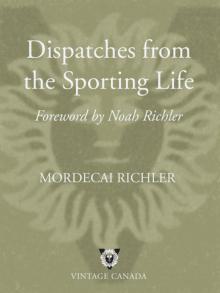 Dispatches From the Sporting Life
Dispatches From the Sporting Life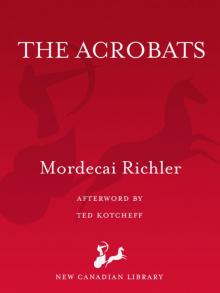 The Acrobats
The Acrobats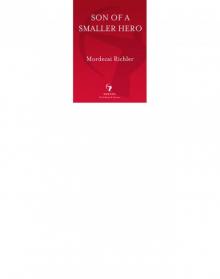 Son of a Smaller Hero
Son of a Smaller Hero Jacob Two-Two-'S First Spy Case
Jacob Two-Two-'S First Spy Case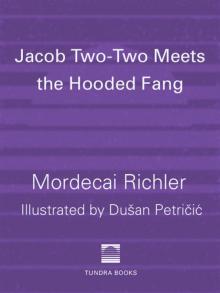 Jacob Two-Two Meets the Hooded Fang
Jacob Two-Two Meets the Hooded Fang Jacob Two-Two and the Dinosaur
Jacob Two-Two and the Dinosaur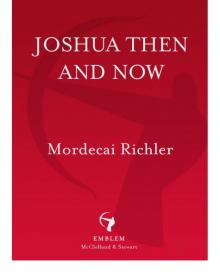 Joshua Then and Now
Joshua Then and Now Solomon Gursky Was Here
Solomon Gursky Was Here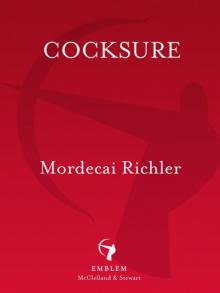 Cocksure
Cocksure The Street
The Street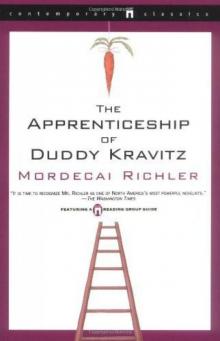 The Apprenticeship of Duddy Kravitz
The Apprenticeship of Duddy Kravitz A Choice of Enemies
A Choice of Enemies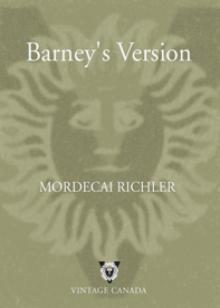 Barney's Version (Movie Tie-In Edition)
Barney's Version (Movie Tie-In Edition)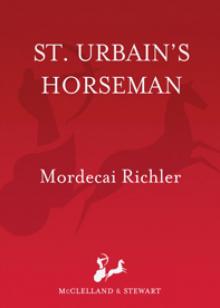 St. Urbain's Horseman
St. Urbain's Horseman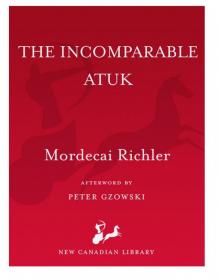 The Incomparable Atuk
The Incomparable Atuk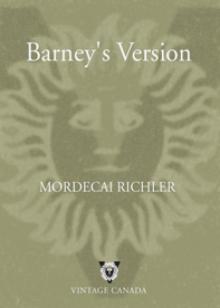 Barney's Version
Barney's Version